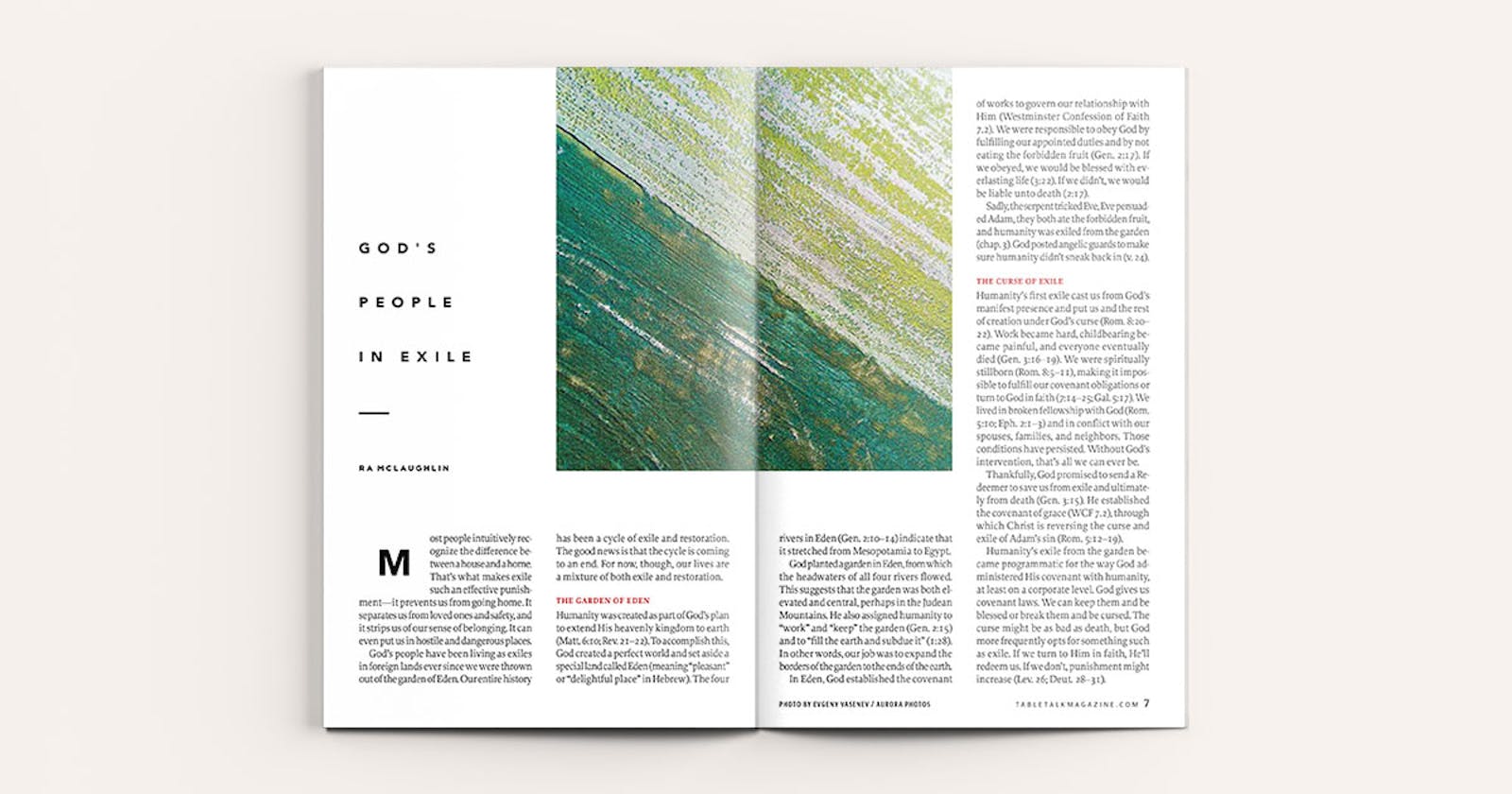
Request your free, three-month trial to Tabletalk magazine. You’ll receive the print issue monthly and gain immediate digital access to decades of archives. This trial is risk-free. No credit card required.
Try Tabletalk NowAlready receive Tabletalk magazine every month?
Verify your email address to gain unlimited access.
Most people intuitively recognize the difference between a house and a home. That’s what makes exile such an effective punishment—it prevents us from going home. It separates us from loved ones and safety, and it strips us of our sense of belonging. It can even put us in hostile and dangerous places.
God’s people have been living as exiles in foreign lands ever since we were thrown out of the garden of Eden. Our entire history has been a cycle of exile and restoration. The good news is that the cycle is coming to an end. For now, though, our lives are a mixture of both exile and restoration.
The Garden of Eden
Humanity was created as part of God’s plan to extend His heavenly kingdom to earth (Matt. 6:10; Rev. 21–22). To accomplish this, God created a perfect world and set aside a special land called Eden (meaning “pleasant” or “delightful place” in Hebrew). The four rivers in Eden (Gen. 2:10–14) indicate that it stretched from Mesopotamia to Egypt.
God planted a garden in Eden, from which the headwaters of all four rivers flowed. This suggests that the garden was both elevated and central, perhaps in the Judean Mountains. He also assigned humanity to “work” and “keep” the garden (Gen. 2:15) and to “fill the earth and subdue it” (1:28). In other words, our job was to expand the borders of the garden to the ends of the earth.
In Eden, God established the covenant of works to govern our relationship with Him (Westminster Confession of Faith 7.2). We were responsible to obey God by fulfilling our appointed duties and by not eating the forbidden fruit (Gen. 2:17). If we obeyed, we would be blessed with everlasting life (3:22). If we didn’t, we would be liable unto death (2:17).
Sadly, the serpent tricked Eve, Eve persuaded Adam, they both ate the forbidden fruit, and humanity was exiled from the garden (chap. 3). God posted angelic guards to make sure humanity didn’t sneak back in (v. 24).
The Curse of Exile
Humanity’s first exile cast us from God’s manifest presence and put us and the rest of creation under God’s curse (Rom. 8:20–22). Work became hard, childbearing became painful, and everyone eventually died (Gen. 3:16–19). We were spiritually stillborn (Rom. 8:5–11), making it impossible to fulfill our covenant obligations or turn to God in faith (7:14–25; Gal. 5:17). We lived in broken fellowship with God (Rom. 5:10; Eph. 2:1–3) and in conflict with our spouses, families, and neighbors. Those conditions have persisted. Without God’s intervention, that’s all we can ever be.
Thankfully, God promised to send a Redeemer to save us from exile and ultimately from death (Gen. 3:15). He established the covenant of grace (WCF 7.2), through which Christ is reversing the curse and exile of Adam’s sin (Rom. 5:12–19).
Humanity’s exile from the garden became programmatic for the way God administered His covenant with humanity, at least on a corporate level. God gives us covenant laws. We can keep them and be blessed or break them and be cursed. The curse might be as bad as death, but God more frequently opts for something such as exile. If we turn to Him in faith, He’ll redeem us. If we don’t, punishment might increase (Lev. 26; Deut. 28–31).
On our own, we can never be good enough to avoid exile, let alone earn God’s blessings. So, Christ does it for us. If we’re united to Him by faith alone, we have the promise of full restoration from Adam’s exile.
The Flood
After being exiled from the garden, humanity descended into further wickedness. We became false worshipers and murderers, despising both God and neighbor. Cain, the first murderer, was exiled from the Lord’s presence in Eden (Gen. 4:16), and his descendants were worse than he had been. Humanity became so evil that God destroyed almost all of us in the flood (chaps. 6–9). Only Noah and his family were spared.
The flood carried Noah to Ararat, just beyond the border of Eden. This geographical move amplified humanity’s curse, taking us further from God’s favored land. Nevertheless, God confirmed the covenant of grace with Noah (6:18; 9:9), indicating that through Noah, humanity would recover what had been lost not just in the flood but in the fall.
Under the Noahic covenant, humanity began to be restored to God’s favor. Correspondingly, we also began to move back into Eden. It was very different by this time, but it still represented the hope of God’s kingdom.
Abraham’s Sojourn
Eventually, God chose Abraham to become the father of a new nation, through which God would fulfill His plan for an earthly kingdom (12:1–3; 17:4–8). Geographically, He led Abraham from the distant portions of Eden in Mesopotamia toward its center.
Abraham’s move was occasioned by God’s grace and blessing rather than by His wrath and curse. Still, it involved his leaving his home without knowing where he was going. Moreover, when Abraham got to Canaan, the land was in a severe famine (12:10). So, he temporarily moved his family to Egypt, then back to Canaan once the famine had ended.
During this time, Abraham’s life seemed far from blessed. His wife was taken into Pharaoh’s harem, his nephew was kidnapped, and Abraham had to lead his household into battle (chaps. 12–14). All this was before God made a covenant with him. God had given him several offers and assurances of land and progeny (12:1–3, 7; 13:14–17) and later confirmed them at Abraham’s request (15:8).
God covenanted to give Canaan to Abraham, along with descendants too numerous to count. Through those descendants, He would extend Abraham’s kingdom over the entire world (vv. 1–21; 17:1–14; Rom. 4:13).
Abraham never saw these promises fulfilled (Heb. 11:13). He lived and died as a foreigner in the very land God had promised to give him, with only one son (Isaac) to whom God had extended the covenant promise (Gen. 22:16–18). But neither Abraham nor anyone in Scripture after him ever believed that God’s promises had failed. They expected more than just a powerful human kingdom; they expected God’s heavenly kingdom to come to earth (Heb. 11:16).

The Exodus
Two generations later, Abraham’s family moved back to Egypt as honored guests, with God’s promise that they would return to Canaan as a great nation (Gen. 46:3–4). That promise was fulfilled, but only after God allowed the Israelites to be enslaved by the Egyptians for centuries (Ex. 6:6; 12:40).
God returned Israel to Canaan not because they remembered His covenant but because He did (2:23–25). As with Noah and Abraham, the reason for their prolonged suffering appears not to have been their own sin but the sinfulness of others. Nevertheless, God used it for their good (Rom. 8:28). Israel became a mighty nation and left with the plunder of Egypt (Ex. 3:22).
By returning to Canaan, Israel was repeating a move Abraham had made. Like Adam, they had been cast out of the garden. Like Noah, they had been cast out of Eden. Like Adam, Noah, and Abraham, they had been promised a return to Eden, where they would begin to extend God’s kingdom to the ends of the earth.
Israel became unfaithful to God during the exodus. So, even though He allowed the nation to leave Egypt, He didn’t restore them to the promised land. Instead, He extended their exile by having them wander until the entire first generation that had left Egypt, except Joshua and Caleb, had died in the wilderness (Num. 14).
The First Kingdom
In Canaan, Israel struggled for centuries before God made a covenant with David that promised one of his sons would rule Israel forever (2 Sam. 7; Ps. 89). Then, under David’s son Solomon, Israel rose to the height of its power. Its borders stretched to the edges of Eden and its people were too numerous to count (1 Kings 4:20–21), just as God had vowed to Abraham.
Solomon built the temple as God’s house and throne room (1 Chron. 28:2; Isa. 6:1), and Solomon’s own throne was an extension of God’s (1 Chron. 28:5–6; 29:23). Like the tabernacle, the temple and its furnishings echoed imagery from Eden. Both structures outwardly reflected their spiritual purpose of being the place where God dwelled and met with His people. But even here, something was missing. God didn’t walk with His people as He had with Adam in the garden.
Later, Solomon himself became unfaithful. So, in the days of his son Rehoboam, the kingdom was divided between Judah in the south and Israel in the north (1 Kings 12:16–24). Eventually, both the northern and southern kingdoms were taken into new exiles. Just as they had spiritually distanced themselves from God, they were geographically removed from His throne in Jerusalem.
The Last Kingdom
There was an attempt at restoring the kingdom in the days of Ezra and Nehemiah, but it faltered because the people were unfaithful. Ultimately, God did what His people were unable or unwilling to do. He sent His own Son to lead His people out of exile and to build the kingdom of heaven throughout the world.
Where does that leave us now? Are we living in exile, or are we living in God’s heavenly kingdom on earth? In some sense, it’s both. Insofar as God’s kingdom is already here, it’s largely spiritual (Luke 17:20–21). So, we’re physical exiles but not spiritual exiles. We struggle with the physical world, corruptible flesh, and the presence of sin (Rom. 7:14–25; Gal. 5:17). But spiritually, we’re citizens of God’s kingdom, indwelled by the Holy Spirit, and seated with Christ in the heavenly places (Eph. 2:4–7).
Still, Jesus hasn’t yet come back to renew the heavens and earth, and this isn’t the garden of Eden—or rather, the new Jerusalem. The covenant of grace guarantees that when the fullness of God’s kingdom arrives, we’ll never suffer again (Rev. 21:4). Until then, it largely assures us that we will suffer (2 Tim. 3:12). That makes our lives a lot like Abraham’s. We live and walk by faith, knowing that God’s promises are true even when they don’t feel like it.
